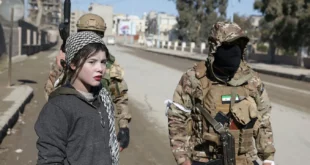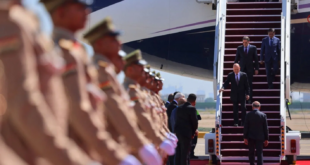n Christmas Eve in 2002, I was suddenly dispatched from my base in Tokyo, where I was the New York Times bureau chief at the time, to Seoul, the capital of South Korea, to cover reports that North Korea was about to reactivate a nuclear reactor that had previously been taken out of service as a result of painstaking negotiations between Washington and Pyongyang.
The United States suspected that if operations resumed at the reactor, which had supposedly been built for research purposes, the North Korean government would soon begin reprocessing its spent nuclear fuel to build up a supply of plutonium for use in a nuclear weapons program.
North Korea denied any such intentions, but in its inimitable fire-breathing way, hinted at a massive retaliation against the United States and its allies in the region—including South Korea, whose capital sits a mere 30 miles from the Demilitarized Zone that divides the Korean Peninsula—if Washington attempted to intervene in any way.
In the years that followed, North Korea built and tested atomic weapons, despite having proclaimed to have no use for them, as well as an increasingly sophisticated array of missiles that now conceivably allow it not only to rain nuclear weapons down upon neighbors like South Korea and Japan, but also to target the distant United States.
North Korea’s gambit was that the United States could only respond by imposing economic sanctions against it. But as a state that was already living under stiff U.S. sanctions, that threat weighed little compared to the advantages it perceived in acquiring a nuclear deterrent that was robust enough to keep its enemies at bay.
Although unheralded in this regard, the North Korean regime’s approach to its security needs was in many ways a model for how Vladimir Putin’s Russia is now pursuing its security interests both in Ukraine and more broadly in Eastern Europe. And well beyond this, Putin’s North Korea-like strategy feels like a harbinger for an era in which the power of the West to contain global security challenges is clearly flagging.
Like the North Korea I covered under Kim Jong Il, the late father of current leader Kim Jong Un, Russia is already familiar with a U.S.-designed sanctions regime aimed at punishing it for its previous annexation of Ukraine’s Crimean Peninsula in 2014. And like the Kim family dynasty, Putin may decide that Russia’s long-term interests will be better served by eliminating what it perceives as the growing security threat of Ukraine and other increasingly Western-leaning states in Eastern Europe, even at the price of stiffened sanctions, rather than appeasing leaders in Washington and various European capitals with the notion of playing by the international system’s prevailing rules.
From their vastly smaller power base, the Kims seem to have revealed the paper-tiger nature of the U.S.-led system of Western alliances, and if a country as small, weak and isolated as North Korea can forge ahead in the pursuit of its own security needs as it alone defines them, one has every reason to expect many more and varied challenges like this in the years to come from other nations.
Putin’s North Korea-like strategy feels like a harbinger for an era in which the power of the West to contain global security challenges is clearly flagging.In a world of sharply declining relative U.S. power and prestige, the threat of economic sanctions to punish geopolitical behavior that offends the West is steadily losing its effectiveness. This is due, in part, to the rise of other powers—led by, but not limited to, China and Russia—that are increasingly willing to step in with trade and financing for countries struck by Western sanctions. But it is also due to the faltering solidarity of Western states themselves, as an ever-growing list of sanctions regimes are imposed on other countries. Europe and Japan need trading partners, and each time a new set of sanctions is announced to punish some kind of infraction of principles, existing and potential markets are taken off the table, offending important constituencies in the rich countries and driving divisions between ostensible allies.
The Western alliance system is handicapped even further by the fact that none of its members seem inclined to risk the lives of their own military servicemembers to impose the respect of cherished principles, even the once near-sacrosanct inviolability of European borders. This includes the United States, which two decades ago sent hundreds of thousands of soldiers to Iraq and Afghanistan, expending trillions of dollars in the process, for security gains that now seem dubious at best. One may question the Biden administration on strategy grounds for ruling out the use of force in opposing Russian expansionism, but virtually no one believes there is any public appetite in the United States for a new major military commitment overseas, much less for trying to face down a power as strong as nuclear-armed Russia.
As many have commented, this leaves the autonomous island of Taiwan as the most obvious area where one might expect a major push to redraw the political map of the world. I would not expect a power play by Beijing targeting Taiwan right away, but if Putin succeeds at locking in security gains in Ukraine as successfully as the Kim dynasty has in acquiring nuclear weapons and long-range missiles, it would be foolish not to expect China to make a move on Taiwan at a moment of its choosing. And in fact, China has already openly reserved this prerogative. Does anyone think that if Putin cannot be deterred by sanctions, China, with its incomparably richer, more sophisticated and globally integrated economy, can be?
One can imagine many more difficult circumstances in the years ahead, as the United States remains rich, strong and important, but dramatically less so than even a decade ago, especially when its power is considered in relative terms. In fact, the scenarios are nearly endless, from war between Saudi Arabia and Iran or their proxies, to a water war between Egypt and Ethiopia, among many more, as wars can arise not only over ideology and religion, but also over water, farmland, shifting population dynamics and the global impact of climate change.
It is increasingly hard to imagine U.S. or Western-led troops having the means or will to sustain global order as situations like these proliferate. And it is similarly difficult to imagine regimes of sanctions, however tough-spirited, being enough to prevent or contain confrontation.
Often the West has devised its diplomatic strategies in an insular way, on the basis of supposed Western ideas and values. As the West’s weight in the world diminishes in relation to that of others, newer and broader coalitions of values will need to be forged. But with little tradition in the West of taking the ideas of the Global South seriously, the hard work required for this has scarcely begun.
 Eurasia Press & News
Eurasia Press & News




